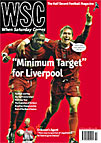 The team with most points winning the league? The teams with fewest going down? As Robert Shaw writes, that hasn’t been the way in Rio and São Paulo – until now
The team with most points winning the league? The teams with fewest going down? As Robert Shaw writes, that hasn’t been the way in Rio and São Paulo – until now
In the highly political world of Brazilian football, two developments received universal acclaim in 2003. First, Palmeiras and Botafogo, two traditional powers, were promoted back to the 24-team top flight a year after relegation. Earning a return on the field, rather than through negotiations in a smoke-filled room, won plaudits for both clubs, who had not been expected to tolerate the humiliation of second division football.
But swallowed pride helped add credibility to the mechanism of automatic relegation and so may have improved the status of Serie B. While Palmeiras and Botafogo were not replaced by other heavyweights, some of Brazil’s better-known clubs realise that they only have a year’s grace until the dogfight becomes much more vicious. In 2004 four teams, instead of two, will be relegated as Brazil starts the planned transition to a 20-team senior division by 2006.
The other unifying factor across the faultlines was the triumph of Vanderlei Luxemburgo’s Cruzeiro, universally recognised as the best team, with many of Brazil’s best home-based players and an infrastructure that would be the envy of many European clubs.
The title success of the side from Mineiro renewed debate about how best to organise the league. For the time the championship was organised on a straightforward home-and-away league basis with no end-of-season play-offs. The gap between Cruzeiro and runners-up Santos was 13 points, but more alarmingly third-placed São Paulo, who along with São Caetano and Coritiba complete Brazil’s 2004 Copa Libertadores quintet, trailed in 22 points further back. Contrast this with 2002, when Santos won the title after narrowly squeaking into eighth at the end of the first phase. Between 1993 and 2002 the leaders at the end of the first stage went on to win the overall title six times, but if the new format had been in place in 2000 and 2001, the winners would have been little São Caetano, a Brazilian version of Wimbledon.
The new format has been defended by several high-profile figures, including former World Cup-winning coach Carlos Alberto Parreira, but Brazilian television bosses were among the dissenters. “Brazilians are accustomed to a final, decisive game and the aggregate points system deprives them of this,” said a spokesman for the main TV network, Globo. The attitude of broadcasters can be explained by the disappointing seasons experienced by Flamengo and Corinthians. Two of Brazil’s best-supported clubs, they were nowhere near the shake-up, although with a play-off system at least one would probably have reached the knockout stage.
Critics have also pointed to falling attendances, but they need to be considered in context. In 1974, when the entire national side were playing in Brazil, the average crowd in the national championship was just 11,599, which declined to 9,136 by the end of the decade. For most of the past 20 years it has struggled to exceed 20,000. This also explains partly why the outmoded state championships have been retained – they are the games that fans still flock to see.
Despite vociferous complaints from some club presidents and clear signals that television remains to be convinced, Brazilian football’s governing body, the CBF, has decided to stick with aggregate points for next season. They have even announced the 2004 fixture list four months in advance.
One of the saddest moments of the season came on the final day. Professional to the last, Luxemburgo’s Cruzeiro side achieved their target of 100 points, racking up 102 goals, with a 7-0 dismantling of Bahia. The latter, from the north-eastern city of Salvador, duly went down to the second along with another northern club, Fortaleza. This was a real pity because Bahia had been one of the country’s three best supported clubs. In 2004 Serie B will resemble a regional superleague for the north-east, but this is a blow for the regional balance that has given Brazil a truly national championship.
But the biggest threat to the new system is if the other teams fail to close the gap on Cruzeiro: the one thing the play-offs did ensure was that it was very difficult for one club to dominate. Brazilians don’t want to have a Manchester United.
From WSC 204 February 2004. What was happening this month